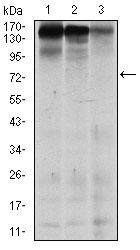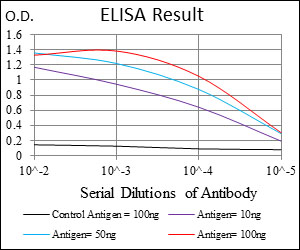GTBP Monoclonal Antibody
- Catalog No.:YM0322
- Applications:WB;ELISA
- Reactivity:Human
- Target:
- MSH6
- Fields:
- >>Platinum drug resistance;>>Mismatch repair;>>Pathways in cancer;>>Colorectal cancer
- Gene Name:
- MSH6
- Protein Name:
- DNA mismatch repair protein Msh6
- Human Gene Id:
- 2956
- Human Swiss Prot No:
- P52701
- Mouse Swiss Prot No:
- P54276
- Immunogen:
- Purified recombinant fragment of human GTBP expressed in E. Coli.
- Specificity:
- GTBP Monoclonal Antibody detects endogenous levels of GTBP protein.
- Formulation:
- Liquid in PBS containing 50% glycerol, 0.5% BSA and 0.02% sodium azide.
- Source:
- Monoclonal, Mouse
- Dilution:
- WB 1:500 - 1:2000. ELISA: 1:10000. Not yet tested in other applications.
- Purification:
- Affinity purification
- Storage Stability:
- -15°C to -25°C/1 year(Do not lower than -25°C)
- Other Name:
- MSH6;GTBP;DNA mismatch repair protein Msh6;hMSH6;G/T mismatch-binding protein;GTBP;GTMBP;MutS-alpha 160 kDa subunit;p160
- Molecular Weight(Da):
- 153kD
- References:
- 1. J Biol Chem. 2009 Dec 11;284(50):34531-7.
2. J Biomed Sci. 2009 Oct 23;16:97.
- Background:
- This gene encodes a member of the DNA mismatch repair MutS family. In E. coli, the MutS protein helps in the recognition of mismatched nucleotides prior to their repair. A highly conserved region of approximately 150 aa, called the Walker-A adenine nucleotide binding motif, exists in MutS homologs. The encoded protein heterodimerizes with MSH2 to form a mismatch recognition complex that functions as a bidirectional molecular switch that exchanges ADP and ATP as DNA mismatches are bound and dissociated. Mutations in this gene may be associated with hereditary nonpolyposis colon cancer, colorectal cancer, and endometrial cancer. Transcripts variants encoding different isoforms have been described. [provided by RefSeq, Jul 2013],
- Function:
- disease:Defects in MSH6 are a cause of susceptibility to endometrial cancer [MIM:608089].,disease:Defects in MSH6 are the cause of hereditary non-polyposis colorectal cancer type 5 (HNPCC5) [MIM:600678]. Mutations in more than one gene locus can be involved alone or in combination in the production of the HNPCC phenotype (also called Lynch syndrome). Most families with clinically recognized HNPCC have mutations in either MLH1 or MSH2 genes. HNPCC is an autosomal, dominantly inherited disease associated with marked increase in cancer susceptibility. It is characterized by a familial predisposition to early onset colorectal carcinoma (CRC) and extra-colonic cancers of the gastrointestinal, urological and female reproductive tracts. HNPCC is reported to be the most common form of inherited colorectal cancer in the Western world. Cancers in HNPCC originate within benign neoplastic polyps ter
- Subcellular Location:
- Nucleus . Chromosome . Associates with H3K36me3 via its PWWP domain.
- Expression:
- Epithelium,Placenta,Pooled,Testis,
- June 19-2018
- WESTERN IMMUNOBLOTTING PROTOCOL
- June 19-2018
- IMMUNOHISTOCHEMISTRY-PARAFFIN PROTOCOL
- June 19-2018
- IMMUNOFLUORESCENCE PROTOCOL
- September 08-2020
- FLOW-CYTOMEYRT-PROTOCOL
- May 20-2022
- Cell-Based ELISA│解您多样本WB检测之困扰
- July 13-2018
- CELL-BASED-ELISA-PROTOCOL-FOR-ACETYL-PROTEIN
- July 13-2018
- CELL-BASED-ELISA-PROTOCOL-FOR-PHOSPHO-PROTEIN
- July 13-2018
- Antibody-FAQs
- Products Images

- Western Blot analysis using GTBP Monoclonal Antibody against MCF-7 (1), HEK293 (2), and HCT116 (3) cell lysate.




